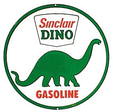Tuesday, August 30, 2005
Happy Talk News
 Just as I suspected.
Just as I suspected. From this a.m.'s NYTimes:
"The region that produces and refines a major portion of the nation's oil and natural gas was largely shut down by Hurricane Katrina yesterday, further tightening strained energy markets and sending prices to new highs...
Crude oil prices on the New York Mercantile Exchange closed at $67.20 a barrel yesterday, up 1.6 percent, after touching a high of $70.80 a barrel in earlier electronic trading.
Natural gas futures soared 11 percent after operations at a major hub in Louisiana were temporarily halted. They closed at $10.85 a thousand cubic feet, after reaching a high of $12.07. Disruptions at refineries also pushed futures for gasoline and heating oil to record highs on Nymex. Gasoline contracts closed up 6.9 percent at $2.06 a gallon while heating oil gained 3.9 percent, to $1.91 a gallon..."
 You knew Big Oil wasn't going to miss this chance. And here's our Little Man, offering us up on the altar of the free market to please his gods at Exxon and Mobil:
You knew Big Oil wasn't going to miss this chance. And here's our Little Man, offering us up on the altar of the free market to please his gods at Exxon and Mobil:"President Bush alluded to the energy situation today during a appearance in El Mirage, Ariz., where he was speaking on Medicare.Not one fucking word about conservation, or reducing reliance on fossil fuels. Not one word.
"You just got to understand that the situation we got ourselves into, dependency on foreign sources of oil, took a while to get there, and it's going to take a while to become less dependent," Mr. Bush said."
But over at Clusterfuck Nation, Jim Kunstler and his guest columnist are thinking about it, you can bet the farm. In a piece rebutting the authors of the popular book Freakonomics, who wrote about peak oil in a rather soothing way, Dmitry Podborits quotes this point and responds:
"The authors claim:
"If oil prices rise, consumers of oil will be (a little) worse off. But, we are talking about needing to cut demand by a few percent a year. That doesn't mean putting windmills on cars, it means cutting out a few low value trips. It doesn't mean abandoning North Dakota, it means keeping the thermostat a degree or two cooler in the winter."
It appears to me that the authors somehow missed in their analysis that the decline of, say, 5% per year in consumption of fossil fuels (against the backdrop of, say, 1% of overall population growth due to demographic reasons and mass migration away from the areas hit the hardest) would translate into a roughly 50% of fossil fuel usage reduction after 10 years. That's the core of the PO argument with which the authors "are not necessarily arguing with" -- that past peak, the oil production will continue to fall, as it will take ever-increasing heroic expenses to keep it flat, and any successes in keeping it flat will be necessarily temporary.
So, in a dozen of years in this scenario -- probably still within the economic life time of a brand new Hummer H2, which has by then recently descended from a factory conveyer somewhere in the state of Michigan on the day the oil has peaked (that day will be known only post factum, of course), purchased through an employee incentives discount and financed on credit, the owner will have to cut a nonessential 50% of his overall driving, keep the thermostat a mere 25 or 30 degrees lower and face doing more of the same in subsequent years, all without abandoning North Dakota, or making any other lifestyle changes."
 Yesterday on NPR they were predicting that gasoline would reach $3.00 a gallon very quickly now that Katrina has offered Big Oil the opportunity. And if it does, you'll never see $1.50 a gallon again. Ever. It will go back down to, oh, say, $2.75, and everyone will be so relieved they'll completely miss the huge ratchet upwards that never really went back down. That's how it's worked for decades now. And unlike in Europe, where they have a huge cushion for price manipulation because of high gas taxes, we hardly tax gas at all, and when it goes up, that's pretty much it...we're stuck.
Yesterday on NPR they were predicting that gasoline would reach $3.00 a gallon very quickly now that Katrina has offered Big Oil the opportunity. And if it does, you'll never see $1.50 a gallon again. Ever. It will go back down to, oh, say, $2.75, and everyone will be so relieved they'll completely miss the huge ratchet upwards that never really went back down. That's how it's worked for decades now. And unlike in Europe, where they have a huge cushion for price manipulation because of high gas taxes, we hardly tax gas at all, and when it goes up, that's pretty much it...we're stuck.Lay in a good supply of blankets, folks. I hear animal fat burns real good.
